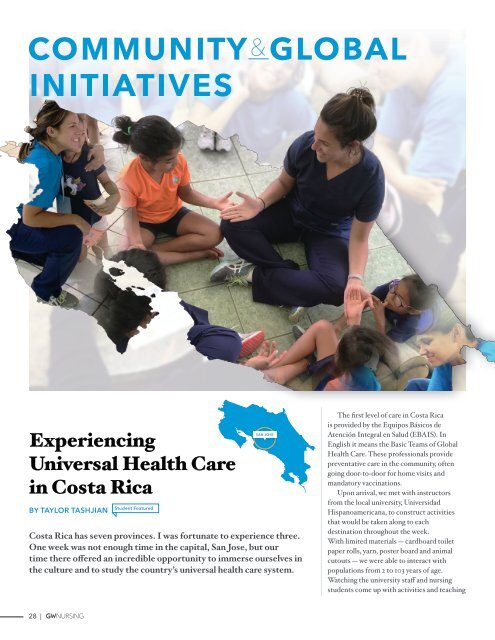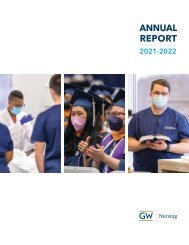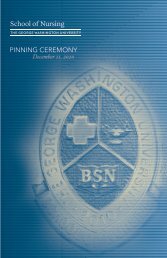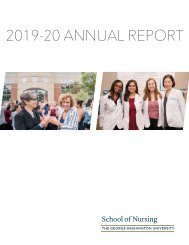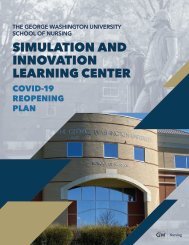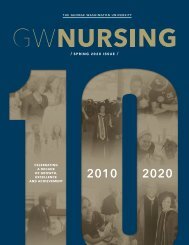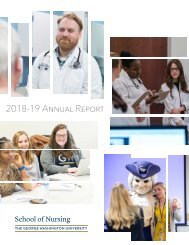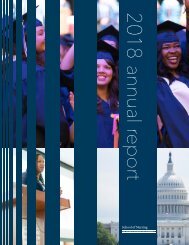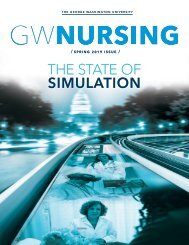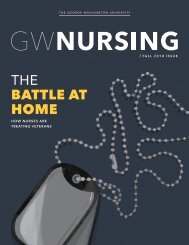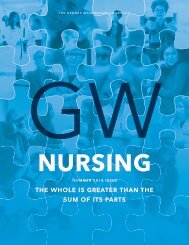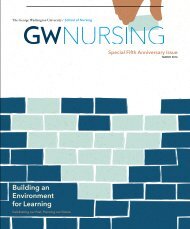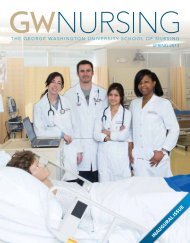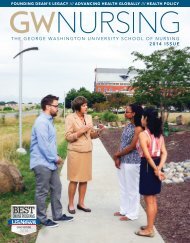GW Nursing Magazine Fall 2019
GW Nursing is a publication of the George Washington University School of Nursing. The magazine tells the story of GW nurses and their endeavors in the areas of education, research, policy and practice.
GW Nursing is a publication of the George Washington University School of Nursing. The magazine tells the story of GW nurses and their endeavors in the areas of education, research, policy and practice.
You also want an ePaper? Increase the reach of your titles
YUMPU automatically turns print PDFs into web optimized ePapers that Google loves.
community&global<br />
initiatives<br />
Experiencing<br />
Universal Health Care<br />
in Costa Rica<br />
BY TAYLOR TASHJIAN<br />
SAN JOSE<br />
Costa Rica has seven provinces. I was fortunate to experience three.<br />
One week was not enough time in the capital, San Jose, but our<br />
time there offered an incredible opportunity to immerse ourselves in<br />
the culture and to study the country’s universal health care system.<br />
The first level of care in Costa Rica<br />
is provided by the Equipos Básicos de<br />
Atención Integral en Salud (EBAIS). In<br />
English it means the Basic Teams of Global<br />
Health Care. These professionals provide<br />
preventative care in the community, often<br />
going door-to-door for home visits and<br />
mandatory vaccinations.<br />
Upon arrival, we met with instructors<br />
from the local university, Universidad<br />
Hispanoamericana, to construct activities<br />
that would be taken along to each<br />
destination throughout the week.<br />
With limited materials — cardboard toilet<br />
paper rolls, yarn, poster board and animal<br />
cutouts — we were able to interact with<br />
populations from 2 to 103 years of age.<br />
Watching the university staff and nursing<br />
students come up with activities and teaching<br />
plans with household items was a great<br />
reminder that health care doesn’t always<br />
require bells and whistles. And although we<br />
didn’t have the opportunity to go into the<br />
community with the EBAIS, the success<br />
of their work was undeniable since the<br />
population as a whole was informed, educated<br />
and overall healthy.<br />
Early in the week, we visited a day care<br />
for children ages 0-12 who were deemed at<br />
“social risk.” These children may, at some<br />
point, not have access to nutritious foods or<br />
be able to play safely in their neighborhoods.<br />
At the day care, though, the children were<br />
eager to play and demonstrated their English<br />
while sharing their culture and hobbies. Kids<br />
as young as 4 knew what foods were healthy<br />
and what habits were unhealthy.<br />
Things came full circle later in the week<br />
when visiting Residencia Geriátrica Juan<br />
Bonal, a geriatric residence, where we met<br />
happy, healthy and engaged individuals, many<br />
older than 100. There was a clear absence of<br />
walking devices, hearing aids and glasses. No<br />
one was interrupted for blood sugar checks or<br />
insulin shots. No oxygen tanks or respiratory<br />
masks were present. People chatted and<br />
recalled events that took place more than 80<br />
years ago as if they occurred yesterday.<br />
Costa Rica was a completely different<br />
environment than any of us had anticipated.<br />
My colleagues and I embarked to San Jose<br />
thinking we may lend a hand or two but, not<br />
long after arrival, we realized the people of<br />
Costa Rica should be sending their students<br />
to teach us about successful health care!<br />
Their health care system is affordable and<br />
accessible and heavily stresses education and<br />
prevention, and this has helped to create a<br />
healthy population. This trip was an eyeopening<br />
reminder that not every country<br />
needs saving. The Costa Rican saying is “Pura<br />
Vida,” translating to “simple life” or “pure<br />
life.” After my time in this beautiful country, I<br />
can’t think of anything more fitting.<br />
<strong>GW</strong> <strong>Nursing</strong> partners with Universidad<br />
Hispanoamericana for this global experience.<br />
The goal for both universities is to provide a<br />
wide spectrum of opportunities and learning<br />
activities that mutually benefit students<br />
and faculty from both institutions of higher<br />
education. More information on the global<br />
experience in Costa Rica is available at<br />
go.gwu.edu/costarica.<br />
community & global initiatives<br />
Students on the Ground:<br />
Clinical Rotations in Ward 8<br />
BY ERIN JULIUS<br />
<strong>GW</strong> <strong>Nursing</strong>’s Accelerated B.S.N. students attend classes in Loudoun<br />
County, Virginia, where the median household income is more than<br />
$130,000 and the county routinely tops lists of the richest in America.<br />
Less than 40 miles away, in Washington, D.C.’s Ward 8, one-third of its<br />
80,000 residents live below the poverty line, which takes a toll on the<br />
health of the community.<br />
“A lot of people don’t take care of themselves,” said B.S.N. student Shavonne Sweatt, who<br />
completed her community clinical rotation at Calvary Women’s Services, a Ward 8 homeless<br />
shelter. “They know what they need to do but don’t have the resources to eat better.”<br />
Dozens of <strong>GW</strong> <strong>Nursing</strong> students have educated residents at Calvary over the course of the<br />
school’s years-long partnership with the shelter.<br />
“The students who spend time with the residents here learn things they can take with them<br />
into their first jobs,” said Gail Chinoy, the <strong>GW</strong> <strong>Nursing</strong> clinical instructor who supervises<br />
students’ rotations at Calvary. “Everyone has a unique story, and to provide effective care, they<br />
must remain nonjudgmental and avoid making assumptions.”<br />
When working in the community, B.S.N. students see the tangible effects of social<br />
determinants of health that are discussed in their classrooms, said Karen Dawn, D.N.P.,<br />
RN, PHCNS-BC, CDE, a <strong>GW</strong> <strong>Nursing</strong> assistant professor and public health clinical<br />
nurse specialist.<br />
Medicaid is available to Washington residents so the issue for the population seen by<br />
students at Calvary is one of health literacy and resources rather than lack of insurance,<br />
Ms. Chinoy said.<br />
“It is important for <strong>GW</strong> nursing students to not just practice and conduct research in<br />
the community but to practice and conduct research with the community,” said Sherrie<br />
Wallington, Ph.D., a <strong>GW</strong> <strong>Nursing</strong> assistant professor whose community-based participatory<br />
research strategy focuses on prevention and health disparities. “This is an important<br />
distinction in training the next cadre of nursing practitioners, leaders, advocates and faculty.<br />
These people have a desire and vision to help deliver quality care and engage and strengthen<br />
our communities to better work toward the reduction of health disparities and toward health<br />
equity for all.”<br />
Ms. Sweatt and fellow student Monelle Jenkins gave a presentation about sexually<br />
transmitted infections (STIs) on their last day at Calvary. The presentation inspired a lively<br />
conversation, with women at the shelter asking about STI testing, female condoms and<br />
preventive measures including GARDASIL®, the HPV vaccine and Truvada®, pre-exposure<br />
prophylaxis (PReP), taken to prevent HIV.<br />
28<br />
|<br />
nursing.gwu.edu | 29


